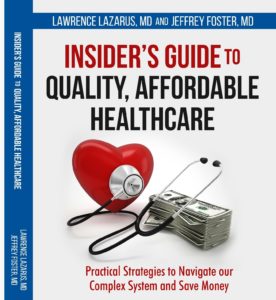Saving Money on Medications
An Excerpt from Insider’s Guide to Quality, Affordable Healthcare
By Lawrence Lazarius, MD and Jeffrey Foster, MD
 In an April 2019 report on Americans’ biggest worries, Gallup found that “fifty-five percent of Americans worry ‘a great deal’ about the availability and affordability of healthcare.” Rapid changes in the U.S. healthcare system and escalating medical costs are causing uncertainty and financial stress for consumers.
In an April 2019 report on Americans’ biggest worries, Gallup found that “fifty-five percent of Americans worry ‘a great deal’ about the availability and affordability of healthcare.” Rapid changes in the U.S. healthcare system and escalating medical costs are causing uncertainty and financial stress for consumers.
To address these concerns, Jeffrey Foster, M.D., author and a patient at Boulder Medical Center, teamed with Lawrence W. Lazarus, M.D. to write the Insider’s Guide to Quality, Affordable Healthcare . Published earlier this year, the book and accompanying website aim to help their readers become knowledgeable and active healthcare consumers and replace their anxiety with confidence. This user-friendly guide is designed to help everyone choose the highest quality healthcare and learn how to contain their out-of-pocket costs.
Below is the first excerpt from the book, which includes links to additional sources that can help you save money on medications. Stay tuned to our blog and Facebook page for more excerpts in the future.
Insurance companies and employers have shifted more of the financial burden of medical care, including medications, onto you in the form of higher co-pays and deductibles. Patients with multiple illnesses can pay thousands of dollars each year for prescription drug. Many seriously ill patients with limited financial means are forced to choose between the necessities of life (food, clothing, and shelter) or the medications necessary for their survival. This excerpt from the book outlines seven ways that consumers can reduce their costs for medicine:
1) Review your Insurance Coverage
- Under Medicare, prescription medications are covered in most Medicare Advantage Plans—if not you can get Medicare Part D;
- “Doughnut hole” costs are decreasing and may end in 2020;
- In January of each year, Medicare Part D and many commercial plans add and delete certain drugs from their formulary. Be aware that the cost of certain drugs, especially new brand name medications, can increase dramatically;
- Each October, make a list of the medications you take. Then call the customer service department of your insurance medication plan and ask 1) if your drugs will still be covered starting in January, and 2) if the cost will be increasing substantially. Find out if the monthly premium will change. You may want to compare your current plan with others available in your area.
2) Try Using Generic Instead of Brand Medicines
- Consider switching to generics or other lower-cost drugs;
- If a brand name is the only choice (because of either no generics or generics have been tried but failed due to side-effects or inadequate effectiveness), ask your provider to submit an authorization request for insurance approval citing the reasons a brand name is needed.
3) Consider Prescription Discount Cards
- These cards are usually free to consumers;
- Provided by some 26 vendors such as: GoodRx; US Pharmacy Card; Discount Drug Network; ScriptRelief; SingleCare;
- If you also have insurance coverage, compare the price for each medication with both your Insurance and Discount Card;
- See this review on Best Prescription Discount Cards
4) Check Patient Assistance Programs for Prescription Drugs
- Some pharmaceutical companies offer income-based assistance for those enrolled in Medicare prescription drug coverage (Part D) or commercial policies, or with no insurance. Find out whether there is a Pharmaceutical Assistance Program for the medications you take;
- Many states offer help paying drug plan insurance premiums and/or other drug costs. Find out if your state has a State Pharmaceutical Assistance Program.
5) Accept Sample Brand Name Drugs from your Doctor’s Office
- If approved or recommended by your physician, try using a sample medication on a short-term basis to see if it is effective before investing in a longer-term prescription. This is especially important if you know that your insurance may not cover the brand.
6) Investigate Buying Medicines on the Internet
- Best to buy only from licensed pharmacies located in the United States;
- You can sometimes save substantially by purchasing drugs from Canada, however, be cautious when buying medications on the Internet. Be wary of sites that do not require a prescription, especially for narcotic drugs. The Insider’s Guide to Quality, Affordable Healthcare includes links to recommended sites.
- Make certain that the Internet company is legitimate and has a person you can talk to on the phone. Also, make certain that the Internet company is certified by the Verified Internet Pharmacy Practice Site (VIPPS),, which means it has met standards set by the National Association of Boards of Pharmacy.
7) Compare Pharmacy Prices
- Check if the price is lower at another pharmacy in your network.
About the authors
Lawrence W. Lazarus, M.D.  has specialized in geriatric medicine and psychiatry at Rush Medical School and University in Chicago, Illinois, where he founded the Geriatric Psychiatry Fellowship Program. He is a former president of the American Association for Geriatric Psychiatry and was awarded numerous teaching and research grants from the National Institute of Mental Health. Dr. Lazarus is in private practice in Santa Fe, New Mexico.
has specialized in geriatric medicine and psychiatry at Rush Medical School and University in Chicago, Illinois, where he founded the Geriatric Psychiatry Fellowship Program. He is a former president of the American Association for Geriatric Psychiatry and was awarded numerous teaching and research grants from the National Institute of Mental Health. Dr. Lazarus is in private practice in Santa Fe, New Mexico.
 Jeffrey Foster, M.D. has spent his clinical and academic career with Geriatric Psychiatry as a prominent focus. He has worked closely with primary care physicians, nurses, social workers and various specialists in hospital and outpatient settings. A former President of the American Association of Geriatric Psychiatry, Dr. Foster has received various teaching and research grants from the National Institute of Mental Health.
Jeffrey Foster, M.D. has spent his clinical and academic career with Geriatric Psychiatry as a prominent focus. He has worked closely with primary care physicians, nurses, social workers and various specialists in hospital and outpatient settings. A former President of the American Association of Geriatric Psychiatry, Dr. Foster has received various teaching and research grants from the National Institute of Mental Health.
For More Information get in touch with Dr. Jeffrey Foster

